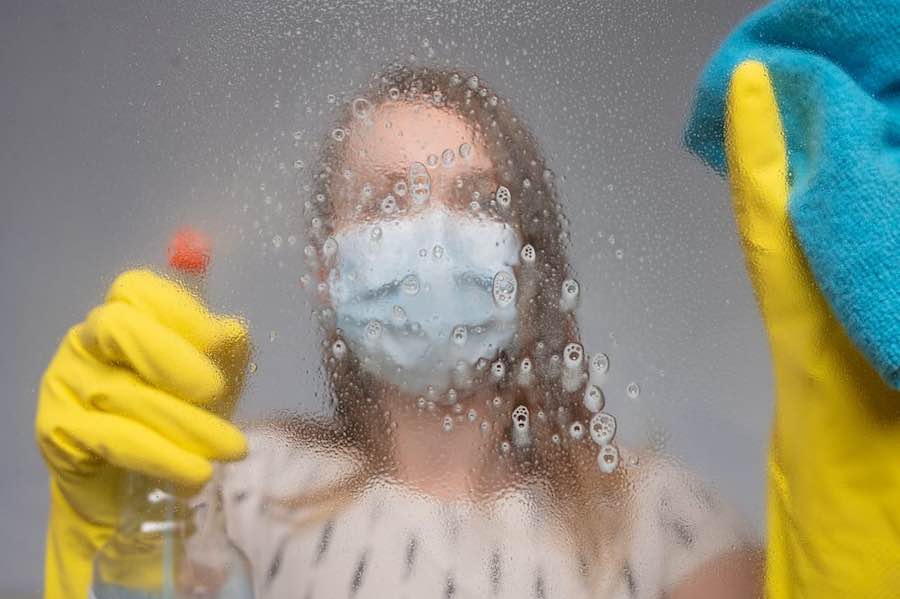
Across the vacation rental industry, companies, associations, governments, and destination marketing organizations are proactively assessing new standards and augmented cleaning protocols to ensure guest safety and build consumer confidence in short-term rentals. Some of these changes include new safety procedures and personal protective equipment (PPE) for cleaners and inspectors, disinfecting products, new kitchen packages, professionally laundered linens, the elimination of bedspreads in favor of hospitality blankets/duvets/top covers, and new messaging for guests.
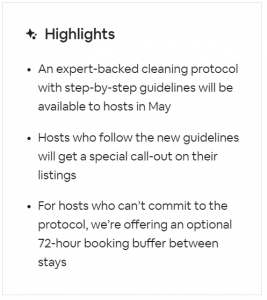
Airbnb announced its Enhanced Cleaning Initiative on April 28, 2020.
More controversially, the industry is discussing the addition of a 24- to 72- hour “buffer” or “safe time” between stays.
Last week, Airbnb introduced its Enhanced Cleaning Initiative. As part of this opt-in program, “hosts will commit to a 24-hour window between bookings,” and Airbnb is expected to add acceptance of this new program to its ranking algorithm, rewarding compliant managers and homeowners with higher placement in search. For hosts who do not want to adhere to the new cleaning protocol, Airbnb has created a tool that automatically blocks three days after each booking. According the website, “Simply opt in to the tool and we’ll automatically create a 72-hour booking buffer between each stay.”
In addition, Florida’s Reopen Florida Task Force is recommending in Phase 2 that vacation rental operators should “Maintain 72 hours between guest check-ins to allow for effective cleaning and disinfecting of the rental unit.” And the Vacation Rental Management Association said that “24 hours between the last exit and next entry is reasonable.”
Potential Cost of a 24- to 72-hour “buffer” between stays
What could the mass adoption of a 24- to 72-hour window between reservations cost vacation rental managers and homeowners? Using 2019 data provided by Key Data and published in January’s VRM Intel Magazine, we calculated the potential impact on revenue.
The following chart demonstrates the average value of days lost per property with a 24- and 72-hour “buffer” between stays.
When we apply the Adjusted Paid Occupancy rate for each destination to the total number days that would be blocked off in the recommended buffer periods, the chart below demonstrates the projected loss in revenue for a company managing 100, 250, and 500 units.
The potential loss of revenue for a vacation rental management company is significant, and explaining this adjustment in income to homeowners could prove to be difficult if expectations are not properly set.
Regulatory Consequences
Besides the potential loss in revenue, there are serious concerns that future regulations will mandate a buffer between bookings. On April 28, as Airbnb announced the Enhanced Cleaning Initiative, CEO Brian Chesky said, “Government officials and policy makers are also focused on our cleaning practices, and we anticipate more regulation in different parts of the world.”
Airbnb has considerable power to influence local policy—as witnessed in many destinations where Airbnb worked with city officials to legalize rentals in primary residences while banning rentals in second homes.
If Airbnb decides that a 24- to 72-hour buffer between stays helps meet its IPO-driven objectives in municipalities, vacation rental management companies and homeowners may be negatively impacted. With additional support from associations (VRMA and FVRMA)—and adoption from large companies (TurnKey, Acme, Carolina Mornings, Moving Mountains, etc.)—this recommendation gain momentum and turn into a requirement very quickly as local and state governments seek ways to show they are “doing something” to make guests safer. In this reactive time we are in, this 24- to 72-hour buffer time has the potential to become a self-inflicted wound for the vacation rental sector—one that comes at a high cost.
Additional considerations in leaving a home unchecked for 24 to 72 hours
There are additional considerations for vacation rental managers and homeowners when waiting 24+ hours before entering the property after a departure. Did the guest leave any entry points to the home unlocked? Was a grill, oven, or appliance left on? Were heating or cooling thermostats set to non-optimal temperatures? Did the guest leave a kitchen full of unwashed pots, pans, and dishes attracting ants or animals? Or as many on the coast have experienced, was a pile of seafood left on the counter leaving a stench that is difficult to remove? Was garbage left in the property or on porches/patios? If the guest knows that no one is entering the property for one to three days, do they really need to leave at checkout time? Is this waiting period going to be upheld after owner stays, as well?
Smart home technology can help address many of these issues, and further investment in these systems will become even more critical with the adoption of Airbnb’s Enhanced Cleaning Protocol or similar recommendations.
Are these 24- and 72-hour recommended “buffer” days necessary?
The real question is: Will a waiting period between stays make guests safer?
According to World Health Organization (WHO), “The virus that causes COVID-19 is mainly transmitted through droplets generated when an infected person coughs, sneezes, or speaks. These droplets are too heavy to hang in the air. They quickly fall on floors or surfaces.”
There is still substantial uncertainty about how long COVID-19 remains on surfaces. WHO’s website states, “The most important thing to know about coronavirus on surfaces is that they can easily be cleaned with common household disinfectants that will kill the virus.”
The American Hotel and Lodging Association (AHLA) is expected to launch its guidelines this week.
To date, the 24- to 72-hour recommendations are not requirements for any government or platform, and we currently do not have any evidence that shows guests need this buffer to be in place in order to feel comfortable booking.
However, as Airbnb and other companies implement these recommendations and advertise the practice, guests and municipalities may be prompted to consider it. The cost for vacation rental providers is high, so we expect to see managers invest in products and processes that eliminate the need for the “buffer” time.

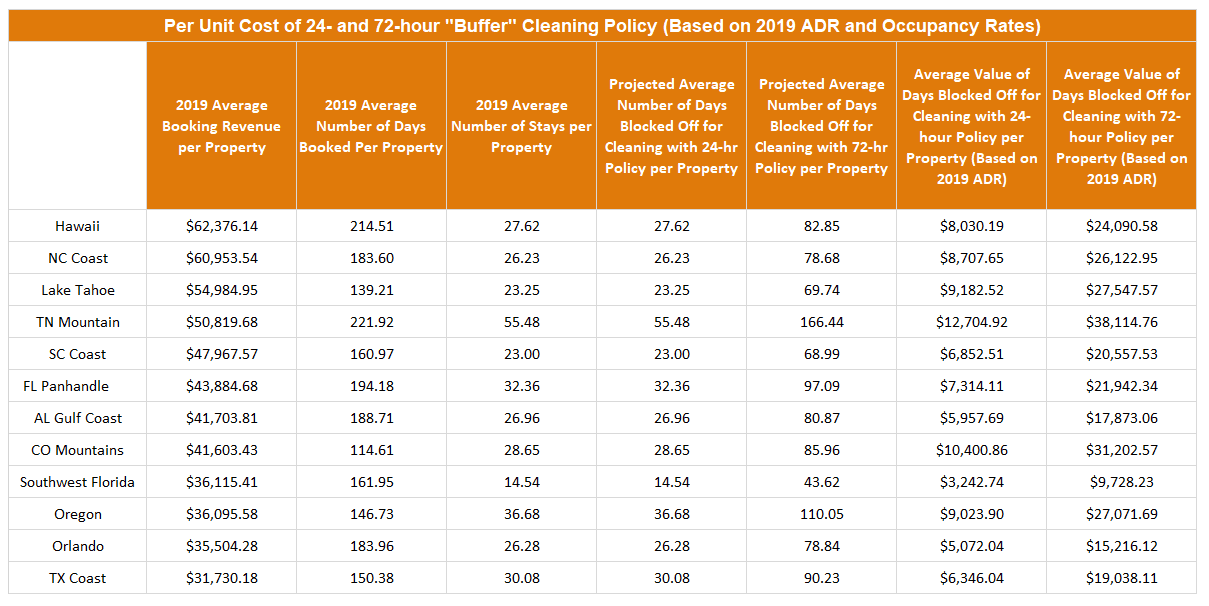
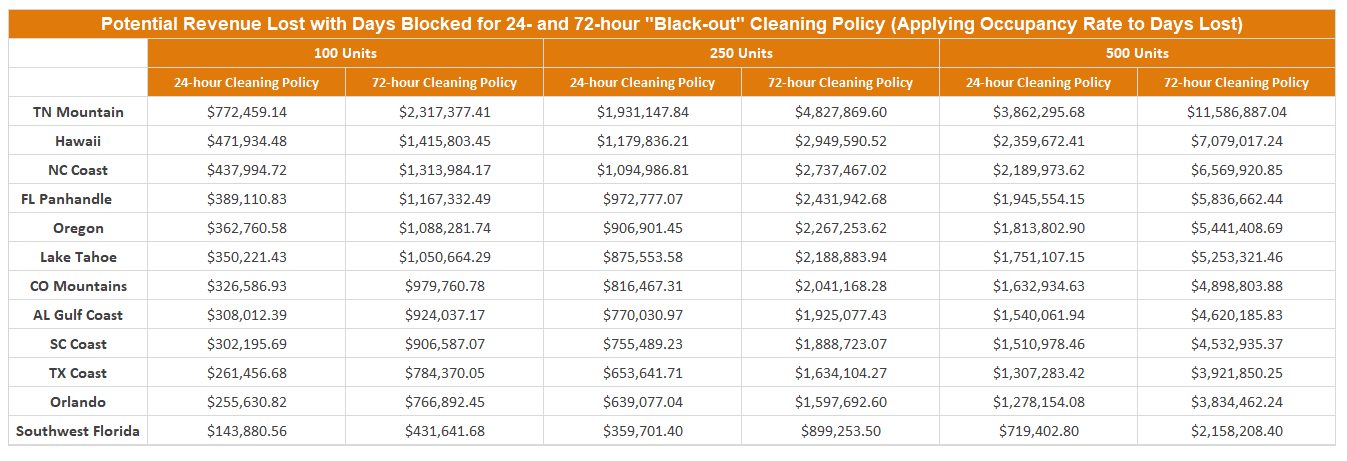
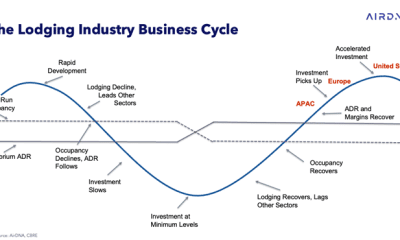

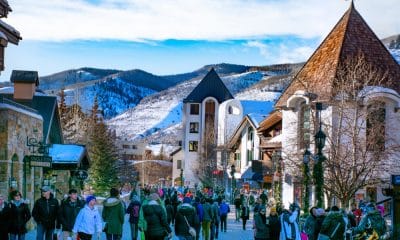








Powerful and impactful math, Amy. Thanks for laying it out!
So are they saying the cleaner waits 24 to 72 hours to go in but then the guest can check in right after the cleaner? That doesn’t make sense. Why? Because the cleaner has worn a mask?
What about other businesses, should they do the same then??? This is targeting by the government! If you are worried about getting or spreading Covid-19, STAY HOME! Don’t take rights away and violate the Constitution! Hotels are still open, I don’t see them blocking out days for SAFETY.
If a guest wants to stay an extra day or 2 they may not be able to.
The day will be blocked.
Cleaning charges are going up. 1 night stays may have to cost more. Or not take them ? Eather way I PAY.
This policy is wrong and unneccesary.
Long before the company and local buearacies thought about stupid rules we were disinfecting every surface and sterilizing everything to hospital standards. Idiots!
This kind of policy puts many of us out of business for no good reason.
Airbnb is negotiating against the interests of it’s most important resource. Honest, ethical hosts.
And, what about bookings still in effect? Do we cancel every other booking for future dates to allow for this 72 hours? My property books a year in advance, and never last minute, as we provide a place for family reunions, workshops, small weddings and such. Guests plan these a year in advance, not spontaneously. This is just another poorly thought out project at Airbnb affecting both hosts and travelers. Airbnb takes a legal stance of zero liability, saying they are a technology platform connecting travelers and hosts, and it is hosts who set their rates and cancellation policies; in reality, Airbnb overrides host policies constantly by imposing penalties on hosts and guests and arbitrarily changing rules and policies.
Seriously? They ate trying to become a publicly traded company and because of the Covid19 they couldn’t do it. Now they are want to really push to do it but everything will be on owners’ expense. They want to look good but they won’t loose a single penny.
Its time for all the owners to lawyer up and squash this Brian Chesky loser ,who promised to give us 25 percent back of all the cancellations he decided to do with our money, which I still have not received and he also promised to have a grants money program for superhosts, which I have not seen a penny, now hes extorting us to complie or get automaticly blocked, how is that a choice. I beg all host’s to lawyer up and send that billionaire packing….. what a total loser
Buffer times are not a long-term solution. But, in times when all travel is being questioned, extreme measures are going to be needed to reassure our guests that it is safe to travel again. Buffer times make sense when your potential guests are still paranoid about infection and have fear of going somewhere new where they don’t have as much control over their environment. Occupancy optimization by reducing the length or even the use of buffer times can only matter when the demand has returned. IMHO this is just one of many new norms that we will have to try to restart travel.
I don’t often disagree with you, but I do on this issue. And this “short-term” solution has a real possibility of becoming a long-term requirement. The quick adoption of this by newer multi-destination companies is largely around their inability to provide back-to-back cleaning. I’m shocked that our industry doesn’t see the introduction of buffer times as an enormous industry threat.
Firstly, Airbnb’s cleanliness initiative is simply an idea, a guideline, nothing more. They cannot monitor what hosts do, nor the level of cleanliness at properties. What they are suggesting is completely moot. So regardless of what Airbnb do, it will be up to individual property managers, owners and hosts to convince potential guests that they are taking cleaning, and their health, seriously. It’s not Airbnb’s responsibility, but the owner or managers. If someone gets sick, you can be sure Airbnb will not be liable.
Something that I heard tonight is staying with me… hospitals don’t leave 24 hours between patients. They are doing something right in terms of cleanliness, right? As you say “The virus that causes COVID-19 is mainly transmitted through droplets generated when an infected person coughs, sneezes, or speaks. These droplets are too heavy to hang in the air. They quickly fall on floors or surfaces.”. So clean properly. No need for 72 hours. Worse case scenario, disinfect the place after 24 hours. But at the end of the day, it’s not about how much time has passed, it’s about how thorough your cleaning is. THAT is what we need to be concentrating on.
I read several nurses that are also hosts say that they thought the idea was ludicrous, as hospitals do not give a room a rest. It is properly cleaned, disinfected, and sanitized and filled again within hours.
thank you for doing the detailed math. Back of envelope for my rentals in Kauai is approximately 50% forced vacancy. During peak seasons, we require 1 week stays from saturday to saturday, as that aligns with flight schedules and people’s ability to take ‘wrap around’ weekend holidays Leave Friday night, arrive saturday AM, stay the week, leave saturday afternoon, return home sunday.
If I am forced to wait 24 – 72 hours, that pushes next check-in to sunday or tuesday dates which people don’t travel or check-in. So, that pushes me out to the next saturday, burning a full week off my calendar.
Not sure if these are unintended consequences in some markets, or just more carelessness in planning.